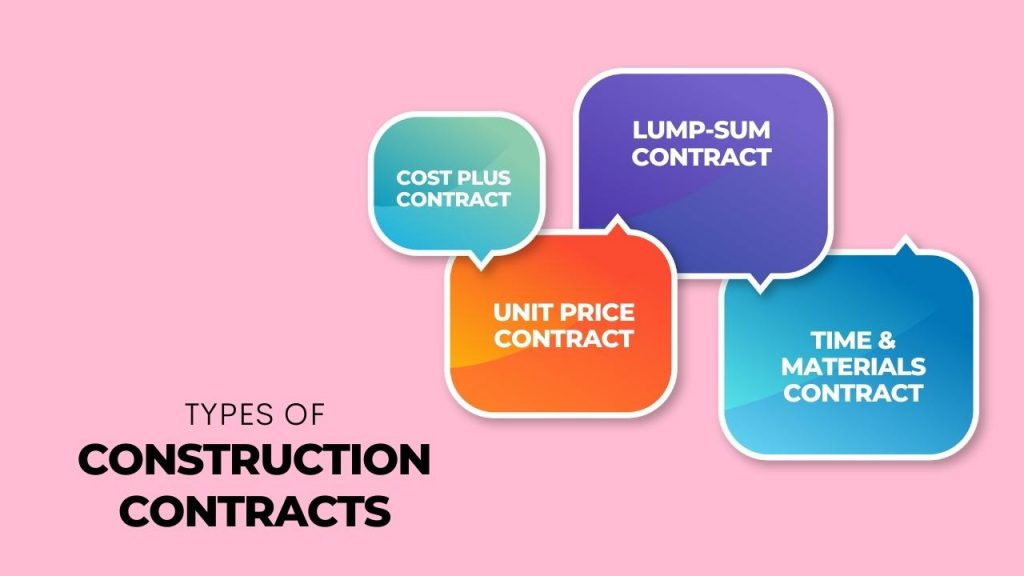Work Hours
Monday to Friday: 7AM - 7PM
Weekend: 10AM - 5PM
Important Types Of Contracts In Construction Industry Every Contractor Should Know

A construction contract is a legal document, usually between a contractor and an owner. In the construction industry, different types of contracts are used for different kinds of work or services.
Now you guys must be wondering what does a construction contract contain?Well, construction contracts specify the terms and conditions of a construction project or service, such as the scope of work, project guidelines and conditions, any compensation payment, if any, a Proper schedule for the execution of works of that project, and penalties, if any, for the delay. They may also spell out the procedure for the distribution of compensation.
Here is the basic list of the items that are included in almost every type of construction contract
- General Conditions
- Special Conditions
- Drawings and specifications
- B.O.Q (bill of quantity)
- Contractor bid
Types of Construction Contracts

Lump-Sum Contract
A lump-Sum contract is also known as a “stipulated sum contract,” a construction agreement in which the contractor or builder agrees to complete the project for a price predetermined by both parties for that construction project.
Under a lump sum contract, the contractor or builder submits a total project price instead of bidding on a particular item or material. This sum includes the cost of work, general condition costs, and the contractor’s or builder’s fee.
In simple words, A lump sum or stipulated sum is simply a single amount of money for completing the entire scope of works that are identified in a construction project.
Unit Price Contract
Second, comes the “Unit Price Contract,” A Unit Price Contract is a type of contract based on estimated quantities of materials and their unit prices. In the price section, all the rates, such as hourly rates, rate per unit work volume, etc., are included. The contractor’s overhead and profit are also included in the rate.
Cost Plus Contract
The third one is the “Cost-plus contracts.” Cost-plus contracts are those which require the owner to pay for all project expenses. These expenses include material, workforce, etc. costs. In a cost-plus contract, the owner agrees to pay a percentage amount that covers the contractor’s profit and overhead costs.
Time And Materials Contract
A time and materials contract is used when the project is open-ended, or its conditions are undefined. Time and materials contracts are used when an accurate estimate of the time and materials needed cannot be calculated.
A time and materials contract is also used in product development and other types of construction projects. A time and materials contract shows how the employer will pay a contractor for the time they spend on the project and the materials they use while executing the work of that project.
Tips for Drafting an Effective Construction Contract
Crafting a robust construction contract minimizes risks and misunderstandings:
- Clearly Define the Project Scope: Detail every task, material, and expected outcome to avoid ambiguities.
- Specify Payment Terms: Include milestones, due dates, and penalties for late payments.
- Outline Project Timelines: Provide start and completion dates with buffer periods for unforeseen delays.
- Use Detailed Clauses: Address risks, legal compliance, and responsibilities explicitly.
- Review Regularly: Update contracts as project requirements evolve to ensure ongoing relevance.
Benefits of Construction Contracts
Construction contracts offer several essential benefits that safeguard the interests of all parties involved:
- Provide Legal Protection: Construction contracts set legally binding terms that protect contractors, construction workers, and project owners from potential disputes.
- Clarify Responsibilities: Contracts define roles, timelines, and project deliverables, ensuring everyone understands their duties.
- Reduce Financial Risks: By outlining payment terms, types of contracts in construction prevent unexpected costs or payment delays.
- Ensure Transparency: These agreements spell out project scope, payment schedules, and deadlines, minimizing misunderstandings.
- Facilitate Dispute Resolution: In case of disagreements, construction contracts act as a reliable reference to resolve conflicts amicably.
Conclusion
A contractor should always understand various construction contracts to decide what suits them and their construction projects. Construction contracts also help maintain clarity between the contractor and the owner and establish straightforward communication.
FAQs
1. What is a construction contract?
A construction contract is a formal agreement outlining the roles, responsibilities, and payment terms for construction workers and contractors. It defines the project’s scope, ensuring clarity between all parties.
2. What are the essential components of construction contracts?
Key elements of different types of construction contracts include general and special conditions, drawings, specifications, a Bill of Quantities (B.O.Q.), contractor bids, and timelines for completion.
3. What are the types of construction contracts?
The types of contracts in construction include lump-sum contracts, unit price contracts, cost-plus contracts, and time and materials contracts. Each type serves a unique purpose based on project requirements.
4. When should you use a time and materials contract?
A time and materials contract for construction workers is ideal for projects with uncertain scopes or undefined timelines, as it compensates for time spent and materials used during the project.
5. Why is understanding the types of contracts in construction important?
Knowing the different types of construction contracts helps contractors and owners select the most suitable agreement for their needs, ensuring smooth communication, fair compensation, and project success.











